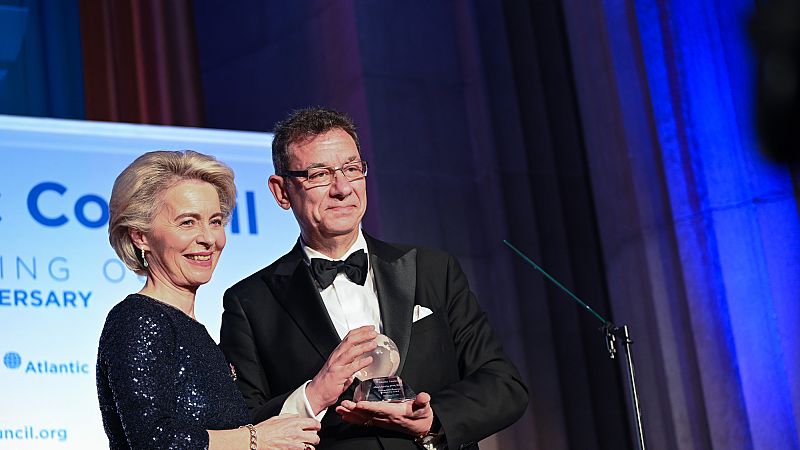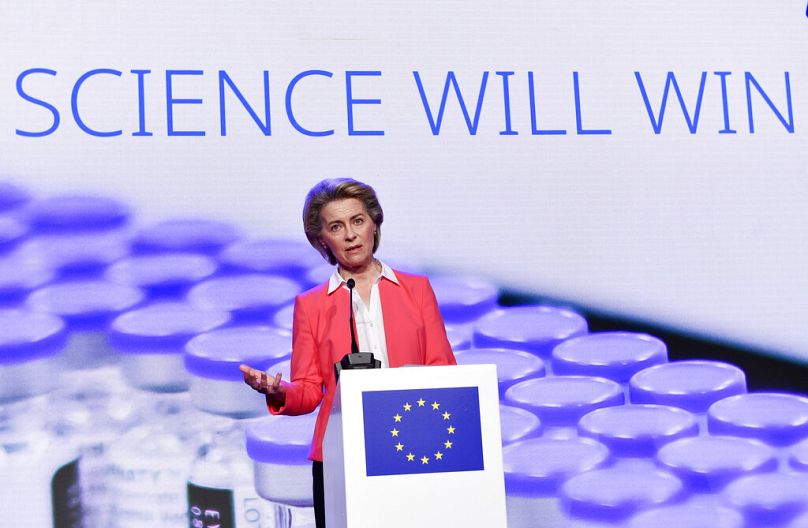
The European Commission “has not given a plausible explanation to justify the non-possession of the requested documents", the European Court of Justice ruled today in The New York Times' case against the EU executive over access to documents surrounding the Pfizer COVID-19 vaccine contracts.
The case was triggered by former New York Times Brussels bureau chief Matina Stevis-Gridneff, and focuses on transparency issues surrounding vaccine procurement during the COVID-19 pandemic, with a particular emphasis on the Commission's failure to disclose text messages sent between European Commission President von der Leyen and Pfizer CEO Albert Bourla.
Now, the General Court has said that the Commission cannot simply claim it does not hold the requested documents; it must provide credible explanations that enable both the public and the Court to understand why those documents cannot be located.
This denouement follows a series of unfortunate events that turned a European success story into an embarrassment for von der Leyen during first mandate at the helm of the Commission.
So-called 'Pfizer-gate' has all the elements of a love story: early romance, suspicion over secret texts, denials, and finally the stage where the former lovers prefer not to talk about it at all.
Euronews catalogues the ups and downs of the relationship.
Honeymoon
It was love at first sight. The COVID-19 vaccine developed by BioNTech and Pfizer was the first to receive EU authorisation back in December 2020, but an advance purchase agreement had been signed a month earlier for an initial batch of 200 million doses.
Pfizer offered a shoulder to cry on at a delicate moment for Europe when the other main vaccine manufacturer AstraZeneca was struggling to commit to its contractual agreements – amid suspicions it was prioritising deliveries to the UK.
Negotiating purchases on behalf of member states, von der Leyen found in Pfizer everything AstraZeneca was unable to offer in terms of trust and reliability.
Further contracts with Pfizer swiftly followed, in March and May 2021, securing in total €2.4 bn's worth of vaccine doses, with an option to purchase an additional 900 million doses – a major route to exit the pandemic.
All was going smoothly, indeed in April 2021 von der Leyen even went to visit Pfizer’s manufacturing ‘home’, in Puurs, Belgium, from where she heralded the target to vaccinate most of Europe’s adult population by the end of that Summer.
But the blossoming romance was about to take a bad turn.
Texts and suspicion
The turning point came with a New York Times report in April 2021 on calls made and text messages exchanged between von der Leyen and Pfizer’s CEO Albert Bourla through which both parties negotiated vaccine contracts – a deal where “personal diplomacy played a big role”, according to the outlet.
Subsequently another journalist, Alexander Fanta, filed a request with the Commission seeking access to the content of these text messages. “No documents falling within the scope of [the] request could be identified,” the EU executive tersely replied.
For the Commission, the ephemeral nature of text messaging means these do not usually qualify as documents requiring registration, since they usually don't carry policies, activities and decisions of the institution.
The Commission's reply triggered an investigation by the European Ombudsman, Emily O’Reilly, who in January 2022 found maladministration in the handling of Fanta's request.
“No attempt was made to identify if any text messages existed,” the Ombudsman said, adding: “This falls short of reasonable expectations of transparency and administrative standards in the Commission."
In January 2023, The New York Times decided to take the Commission to European Court of Justice after they failed to provide them with the texts.

Betrayal and ire
Meanwhile the European Parliament was increasingly irked by its role as the gooseberry in the von der Leyen/Pfizer affair. MEPs sought clarification and transparency on the vaccine deals in more than 20 parliamentary questions filed with the Commission.
One such poser filed by MEP Sophie in ‘t Veld (The Netherlands/Renew) elicited a further response - from Commission vice-president for transparency Věra Jourová - citing the ephemeral nature of text messages.
The lack of information angered lawmakers, who became more incensed when Pfizer’s Bourla rejected two invitations from the Parliament’s special committee on COVID-19 (COVI) to discuss the issue.
These incidents led to MEPs calling to ban access to the Parliament to Pfizer’s representatives – a move ultimately rejected by the Parliament’s conference of presidents.
In March 2023, Health Commissioner Stella Kyriakides appeared at the request of the COVI to participate in a heated exchange with MEPs, during which she insisted that “the Commission president was not involved in any COVID vaccine contract negotiations. I have said this before, and I will say it again.”
Breakup or happily ever after?
Back to today's ruling, the ECJ found that The New York Times had submitted relevant and consistent evidence indicating the existence of text messages between the President of the Commission and the CEO of Pfizer regarding the procurement of COVID-19 vaccines.
For the EU judges, the Commission has not explained in detail the type of searches that it carried out to find those documents or the identity of the places where those searches took place. Accordingly, it has not given a plausible explanation to justify the non-possession of the requested documents.
"Transparency has always been of paramount importance for the Commission and President von der Leyen. We will continue to strictly abide by the solid legal framework in place to enforce our obligations," said the Commission in an statement after the ruling.
The European Commission has two months to appeal the Court of Justice’s decision.







